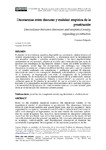Mostrar o rexistro simple do ítem
Disonancias entre discurso y realidad empírica de la prostitución
| dc.contributor.author | Delgado Álvarez, Carmen | |
| dc.date.accessioned | 2019-02-20T08:18:23Z | |
| dc.date.available | 2019-02-20T08:18:23Z | |
| dc.date.issued | 2018 | |
| dc.identifier.citation | Atlánticas. Revista Internacional de Estudios Feministas, 2018, 3 (1), 85-112 | es_ES |
| dc.identifier.issn | 2530-2736 | |
| dc.identifier.uri | http://hdl.handle.net/2183/21869 | |
| dc.description.abstract | [Resumen] Partiendo de la evidencia empírica disponible se cuestiona la validez teórica del modelo regulacionista de la prostitución. La disonancia entre la investigación con muestras amplias y pruebas estandarizadas, y las tesis regulacionistas sustentadas en excepciones, plantea al modelo una contradicción que trata de resolver con estrategias de legitimación dentro y fuera del ámbito académico. El imaginario social lego ha incorporado, sin embargo, sus categorías discursivas tomadas de la lógica neoliberal del libre mercado, como se muestra en el estudio realizado con estudiantes y población general. El discurso articulado en torno a una concepción idealizada, individualista, y despolitizada de la libertad, ha impregnado con éxito el imaginario de la población universitaria. En la estructura de la representación de la prostitución, emerge una dimensión de legitimación “blanda o benevolente”, no presente en la población general. Se plantea la necesidad de mayor atención a los procesos formativos de imaginarios sociales legos desconectados de la realidad empírica, y la necesidad de apropiarse de «campos entrecruzados» de conocimiento para abordar el entramado del fenómeno prostitucional | es_ES |
| dc.description.abstract | [Abstract] Based on the available empirical evidence, the theoretical validity of the regulationist model of prostitution is questioned. The dissonance between research with broad samples and standardized tests, and the regulatory thesis supported by exceptions, presents the model with a contradiction that it tries to solve with strategies of legitimation, inside and outside the academic sphere. The lay social imaginary has, however, incorporated its discursive categories taken from the neoliberal logic of the free market, as shown in the study carried out with students and the general population. The discourse articulated around an idealized, individualistic, and depoliticized conception of freedom has successfully impregnated the imaginary of the university population. In the structure of the representation of prostitution, a "soft or benevolent" legitimation dimension emerges, not present in the general population. The need arises for greater attention to the training processes of lay social imaginaries disconnected from empirical reality, and the need to appropriate "cross-linked fields" of knowledge to address the framework of the prostitution phenomenon | es_ES |
| dc.language.iso | spa | es_ES |
| dc.rights | Atribución-CompartirIgual 3.0 España | es_ES |
| dc.rights.uri | http://creativecommons.org/licenses/by-sa/3.0/es/ | * |
| dc.subject | Prostitución | es_ES |
| dc.subject | Imaginario social | es_ES |
| dc.subject | Regulacionismo | es_ES |
| dc.subject | Abolicionismo | es_ES |
| dc.subject | Prostitution | es_ES |
| dc.subject | Discourse | es_ES |
| dc.subject | Social imaginary | es_ES |
| dc.subject | Regulationism | es_ES |
| dc.subject | Abolitionism | es_ES |
| dc.title | Disonancias entre discurso y realidad empírica de la prostitución | es_ES |
| dc.title.alternative | Discordance between discourse and empirical reality regarding prostitution | es_ES |
| dc.type | info:eu-repo/semantics/article | es_ES |
| dc.rights.access | info:eu-repo/semantics/openAccess | es_ES |
| UDC.volume | 3 | es_ES |
| UDC.issue | 1 | es_ES |
| UDC.startPage | 85 | es_ES |
| UDC.endPage | 112 | es_ES |
| dc.identifier.doi | http://dx.doi.org/10.17979/arief.2018.3.1.3268 |






